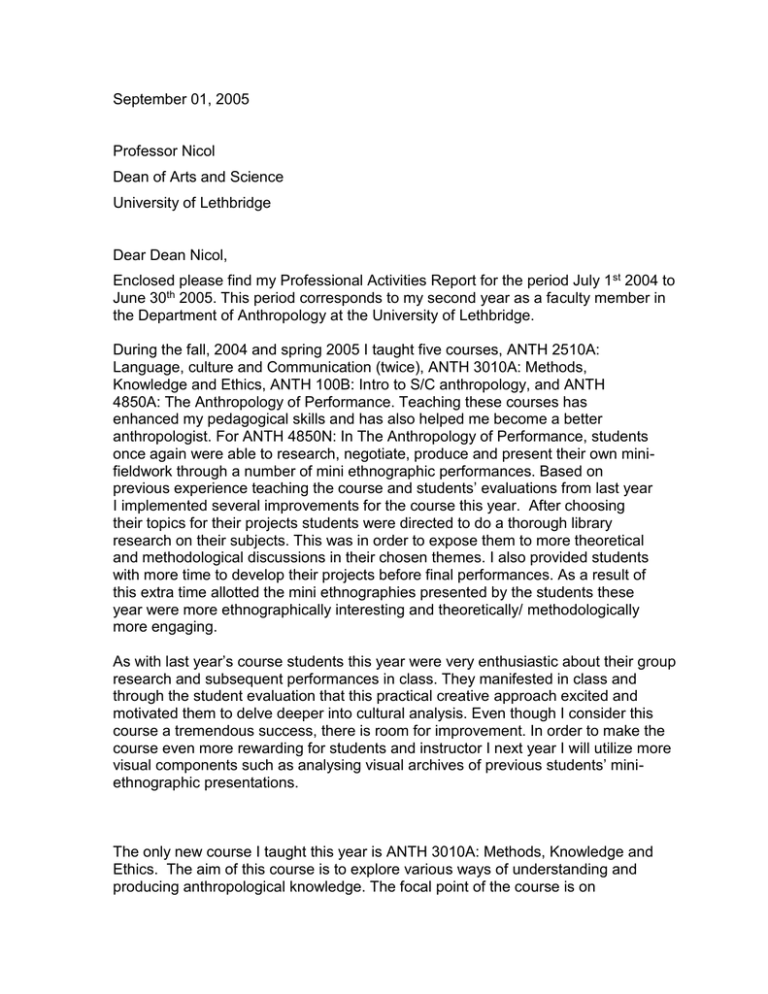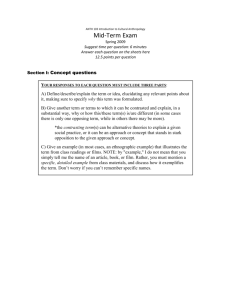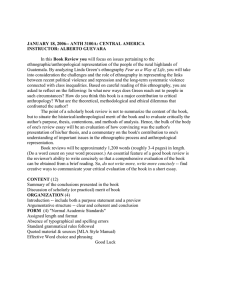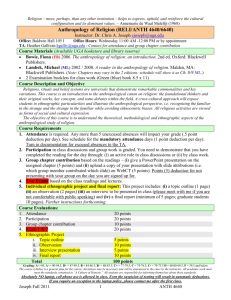September 01, 2005 Professor Nicol Dean of Arts and Science
advertisement

September 01, 2005 Professor Nicol Dean of Arts and Science University of Lethbridge Dear Dean Nicol, Enclosed please find my Professional Activities Report for the period July 1 st 2004 to June 30th 2005. This period corresponds to my second year as a faculty member in the Department of Anthropology at the University of Lethbridge. During the fall, 2004 and spring 2005 I taught five courses, ANTH 2510A: Language, culture and Communication (twice), ANTH 3010A: Methods, Knowledge and Ethics, ANTH 100B: Intro to S/C anthropology, and ANTH 4850A: The Anthropology of Performance. Teaching these courses has enhanced my pedagogical skills and has also helped me become a better anthropologist. For ANTH 4850N: In The Anthropology of Performance, students once again were able to research, negotiate, produce and present their own minifieldwork through a number of mini ethnographic performances. Based on previous experience teaching the course and students’ evaluations from last year I implemented several improvements for the course this year. After choosing their topics for their projects students were directed to do a thorough library research on their subjects. This was in order to expose them to more theoretical and methodological discussions in their chosen themes. I also provided students with more time to develop their projects before final performances. As a result of this extra time allotted the mini ethnographies presented by the students these year were more ethnographically interesting and theoretically/ methodologically more engaging. As with last year’s course students this year were very enthusiastic about their group research and subsequent performances in class. They manifested in class and through the student evaluation that this practical creative approach excited and motivated them to delve deeper into cultural analysis. Even though I consider this course a tremendous success, there is room for improvement. In order to make the course even more rewarding for students and instructor I next year I will utilize more visual components such as analysing visual archives of previous students’ miniethnographic presentations. The only new course I taught this year is ANTH 3010A: Methods, Knowledge and Ethics. The aim of this course is to explore various ways of understanding and producing anthropological knowledge. The focal point of the course is on epistemological and writing developments in ethnographic anthropology. The course studies the fundamentals or central principles of ethnographic methodology and its paradoxes. The course is based on assigned readings, lectures, films, class conversations, exercises, examinations and ethnographic presentations. The first component of the course looks at ethnography as an intercultural dialogue, and it examines the central principles of anthropological fieldwork methods and writings. We discuss topics such as the politics of representation. The second component focuses on issues pertaining to the production of ethnographies. In this section the students analyze a complete ethnography as well as produce their own mini-ethnography. Teaching this course has been challenging and rewarding. I have received very encouraging and critical feedback from students both in class and through student evaluations. I therefore will try my best to improve the content and the form of the course for the next time. Considering some students uneasiness with my open-endedness approach to the development of the methodology of the course, I will make sure to be very specific and detailed on the implementation of my next outline. I also taught ANTH 2510A: Language, culture and Communication (twice), ANTH 100B: The second course I taught in the Spring 2004, Language Culture and Communication, was also a great experience for me, and for my students. It was an excellent avenue to discuss the importance of communication (verbal and non-verbal) in understanding intercultural dialogues, discourse, power structures, multiculturalism, bilingualism, etc. The main objectives of this course are to critically reflect on the process of communication and the role of language crossculturally. This course introduces students to basic concepts, problems, and methodologies utilized by anthropologists in the study of the relationship between language, culture and communication. The course is based on lectures, assigned readings, films, class conversations, exercises and examinations. Given my background in communication, I was very happy to have the opportunity to teach this fundamental course. Even though I consider my teaching to be solid, I realize that for this course there are some pedagogical elements that I need to reexamine. Through immediate feedback and evaluations from students, I discovered that many found the course to be too focused on the mechanics of language. In order to adjust to this criticism I implemented some major changes for next semester. I have changed most of the readings; in doing so, I will be shifting the focus from language to communication and popular culture. Due to the increase in the size of the class for 2000 level courses, I have also made some minor changes to the way I evaluate students’ academic performance in the course. The third course I taught during this period (Summer I 2004) was ANTH: 3100A Central America: Memory, Machos and Machillas. This course was an introduction to Central America from an anthropological point of view. By focusing on the politics of colonialism, neo-colonialism, revolution, poverty, gender and memory in Central America, the course was able to map out the distinctive realms of power relations in the region. Facilitated by anthropological readings, films, lectures, and discussions the main purpose of the course was three fold: 1). to briefly familiarize students with the histories of Central America, 2). to provide students with an in-depth understanding of two case studies (Nicaragua and Guatemala), and 3). to critically evaluate representations of regional issues through anthropological critical tools. The course was based on assigned readings, lectures, films, class conversations, exercises and examinations. These were facilitated by group discussions of contrasting anthropological and non-anthropological representations of the region’s issues I have received very encouraging feedback from students both in class and in student evaluations. I am very pleased with the way the course evolved in terms of form and content. The students’ engagement in the overall course dynamics made for a fascinating learning environment. Besides updating readings and social, political and economic issues of the region, I do not foresee many changes for the course. During this period of the year 2004 I submitted two papers for publication. “The Theatre of Ethnography: Intention and Audience in Anthropological Encounters,” was submitted to the journal “Representations”. This paper discusses performance-audience relationship in ethnography. This paper directs its attention to the complexity of the meeting of intentionalities in the ethnographic encounter as central to the ethnographic endeavor at all times, referring both to the ethnographic encounter itself and to the presentation of it. “A Nation, a Community and a Play: Identity, Theatre and Nationhood in Nicaragua,” was submitted to the journal “Anthropology and Humanism”. This article traces and compares local, contemporary practices of the play, in the form of its annual performance in the town of Diriamba, with elite Nicaraguan intellectuals’ understanding of the El Gueguense script. It is my argument that the El Gueguense annual performance performs and critiques current national discussions about post-revolutionary socio/economic inequalities in Nicaragua. This summer, with the assistance of a University of Lethbridge Internal SSHRC Grant, I began anthropological field research on the theatricalization of violence in Nepal. In two months of fieldwork in the Kathmandu and Tarai areas, I was able to immerse myself in various social stages of Nepalese social conflict, particularly theatre, mass media and political gatherings. Through this I had the opportunity to conduct background research on (social and cultural) actors in the national conflict and their theatricalization of violence, while establishing important links with different social groups (Dalit and Tarai), social and political activists (theatre groups in Kathmandu and the Eastern part of the country), government representatives (members of parliament) and revolutionary activists. In this process I was also able to assess media representations of the political and armed conflict through TV programs, newspapers, and other media outlets. I was also, and perhaps most importantly, able to meet possible “informants” in the capital and in the cities of Hetauda and Sinduli. The following summer (2005), I intend to join one theatre group (either in Hetauda or Sinduli) to take part in the preparations, rehearsal, performances, and organized and impromptu social and cultural gatherings. I also intend to participate in my hosts’ daily cultural and social activities, political activities and day-to-day survival. My potential “informants” have indicated to me that they would be most happy to welcome me in their communities. To insure this plan of continued research, I will be applying for a SSHRC External Grant this academic year. In the next month I intend to write and send for publication a descriptive report of the situation of popular theatre for social change in Nepal. Ultimately, the results of the proposed multi-year research will take the form of anthropological articles and a book. I also intend to present my ethnographic findings over the years to come at various conferences, including CASCA and AAA conferences. My service to the University has been limited due to my status as a non-tenure track faculty member. I nonetheless would like to start participating in the overall life of the University. I have volunteered to start a radio program next semester and I am also preparing a multidisciplinary, multi-media show on Nicaragua for the Fall of 2004. I am very grateful for the opportunity to be part of the faculty here at Lethbridge and look forward to enriching my career at the University of Lethbridge. Sincerely, Alberto Guevara





